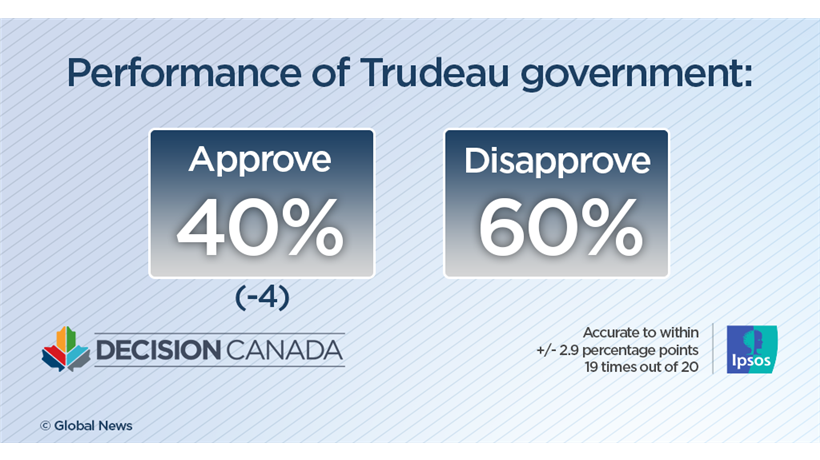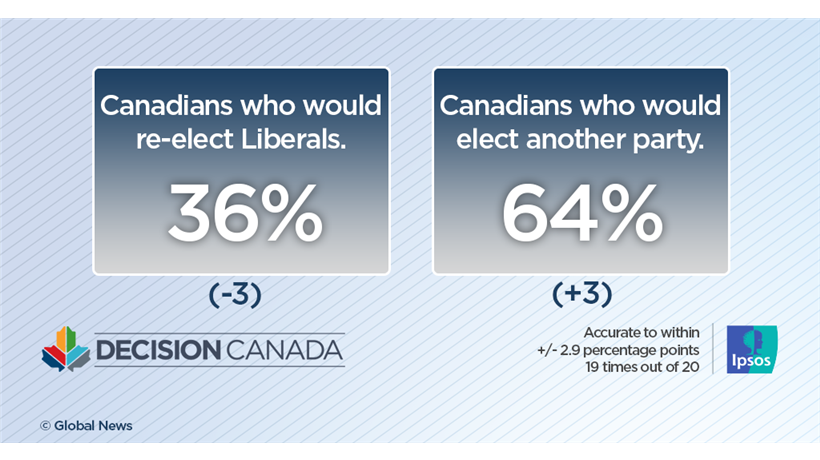In the aftermath of Liberal Party Leader Justin Trudeau‘s blackface and brownface scandal, the Conservative Party has gained a four-point lead over the Liberals, according to a new poll.

The latest Ipsos poll, conducted exclusively for Global News between Sept. 20 and 23, shows that 36 per cent of respondents would vote for the Tories if an election were held the next day and 32 per cent would vote for the Liberals — a loss of three points for the incumbent party.
The poll surveyed 1,500 Canadians on whether they had seen or heard of the images of Trudeau in blackface and brownface that have prompted him to apologize. Most (76 per cent) had seen the images — only 10 per cent said they were unaware of the controversy.
LISTEN BELOW: Sean Simpson with Ipsos Reid joins the Ryan Jespersen Show
Respondents were asked about their opinions on Trudeau’s apology. The poll found that 20 per cent indicated his behaviour was inexcusable and that he should step down as prime minister, but close to half indicated that Trudeau’s apology was adequate and he should continue on as Liberal Party leader.
“About half of Canadians tell us that they’re prepared to accept the prime minister’s apology,” said Darrell Bricker, president of Ipsos. “But many others are somewhat concerned about what this happened to show, and they’re not quite as ready to move on yet.”

Get breaking National news
WATCH: Trudeau controversy dominating election campaign

Bricker also said that the four-point Tory lead over the Liberals makes this campaign a “game of inches.”
“With that type of momentum, they could be building towards a victory on election day,” he said.
Just last week, Trudeau had a seven-point lead over Conservative Party Leader Andrew Scheer in an Ipsos poll that asked voters who would make a better prime minister. That lead has dropped to two points, as the latest poll found that 33 per cent of Canadians favour Trudeau for prime minister and 31 per cent believe Scheer is the best choice.
“Clearly the events of last week have put a puff of wind under the sails of Andrew Scheer and his party,” Bricker said.
The poll found that among Liberal voters, 67 per cent said Trudeau’s apology was enough but 33 per cent indicated otherwise, with 28 per cent saying they remain open to supporting the Liberals but they question Trudeau’s judgement. Only 1 per cent said they thought he should step down as prime minister.
So far the campaign’s first two weeks appear to be “working to the advantage of the Conservatives,” said Bricker.
“The most damaging part of all of this is that the Liberals just don’t seem to be getting any traction,” he said.
The Ipsos poll also asked about people’s thoughts on the current government’s performance. Approval has dipped slightly, by four points, with 40 per cent of Canadians approving of the current government. The approval is lukewarm, with only 7 per cent indicating they strongly approve while 33 per cent indicated they somewhat approve.
WATCH: Does ‘blackface’ impact your vote?

The blackface and brownface images made a dent in the Liberal Party’s prospects for sure, Bricker said.
“I haven’t seen anything in a campaign in a while have as rapid an impact as the photo incident,” he said. “Normally these things tend to be a little bit more gradual, but it’s pretty clear that this incident has had a pretty direct impact on the electability of the Liberal Party and they now trail their main rival.”
The poll also found that, if an election were held tomorrow, 15 per cent of respondents said they would vote for NDP while 4 per cent of Canadians would vote for Bloc Québécois, down by one point, and 2 per cent would choose the People’s Party of Canada.
Just a little over a third (36 per cent) of respondents indicated they think the Trudeau government has done well and should be re-elected while close to two in three (64 per cent) said it’s time for another party to lead.
NDP leader Jagmeet Singh polled slightly higher this week among those asked about who they think would make the best prime minister: 14 per cent of respondents chose him, up from 10 per cent last week.
The poll also found that while the Liberals are still polling well in terms of voters’ intentions in Quebec, they are now tied with the Conservatives in Ontario — meaning the eight-point lead they had last week is now gone.
These are some of the findings of an Ipsos poll conducted between September 20 and 23, on behalf of Global News. For this survey, a sample of n = 1500 Canadians aged 18+ was interviewed online via the Ipsos I-Say panel and non-panel sources. Respondents earn a nominal incentive for their participation. Quotas and weighting were employed to balance demographics to ensure that the sample’s composition reflects that of the adult population according to Census data and to provide results intended to approximate the sample universe (weighting efficiency = 63.9%). The precision of Ipsos polls which include non-probability sampling is measured using a credibility interval. In this case, the poll is accurate to within ± 2.9 percentage points, 19 times out of 20, had all Canadians been polled. The credibility interval will be wider among subsets of the population. All sample surveys and polls may be subject to other sources of error, including, but not limited to coverage error, and measurement error. Ipsos abides by the disclosure standards established by the Canada Research Insights Council, found here.












Comments
Want to discuss? Please read our Commenting Policy first.